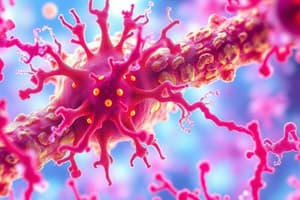Podcast
Questions and Answers
What is the term 'immune' derived from?
What is the term 'immune' derived from?
- Old English word 'imun' meaning non-susceptibility
- Sanskrit word 'imuna' meaning resistance
- Greek word 'immunis' meaning protected against diseases
- Latin word 'immunitas' meaning free from various civic duties (correct)
What is the collective and coordinated reaction of immunocompetent cells and their secretory products against the invader referred to as?
What is the collective and coordinated reaction of immunocompetent cells and their secretory products against the invader referred to as?
- Antigenic defense
- Immunological warfare
- Immune attack
- Immune response (correct)
What are the soldiers of the immune system referred to as?
What are the soldiers of the immune system referred to as?
- Antigenic warriors
- Immunocompetent cells (correct)
- Microbe fighters
- Invader defenders
What is an individual called if they have not previously encountered a microbe?
What is an individual called if they have not previously encountered a microbe?
What is an individual called if they are exposed to the antigens of a microbe and develop resistance to later infection by that microbe?
What is an individual called if they are exposed to the antigens of a microbe and develop resistance to later infection by that microbe?
Flashcards are hidden until you start studying
Study Notes
Immune System Terminology
- The term 'immune' is derived from the Latin word "immunis," meaning exempt or protected.
Immune Response
- The collective and coordinated reaction of immunocompetent cells and their secretory products against an invader is referred to as the immune response.
Soldiers of the Immune System
- Cells that act as the defenders or "soldiers" of the immune system are known as leukocytes (white blood cells).
Naive Individuals
- An individual who has not previously encountered a microbe is referred to as naive or immunologically naive.
Immunological Memory
- An individual who is exposed to the antigens of a microbe and develops resistance to subsequent infections by that microbe is described as having acquired immunity.
Studying That Suits You
Use AI to generate personalized quizzes and flashcards to suit your learning preferences.




